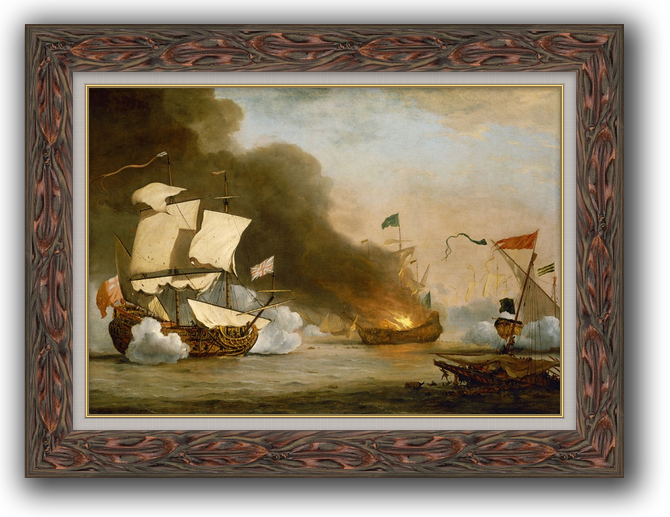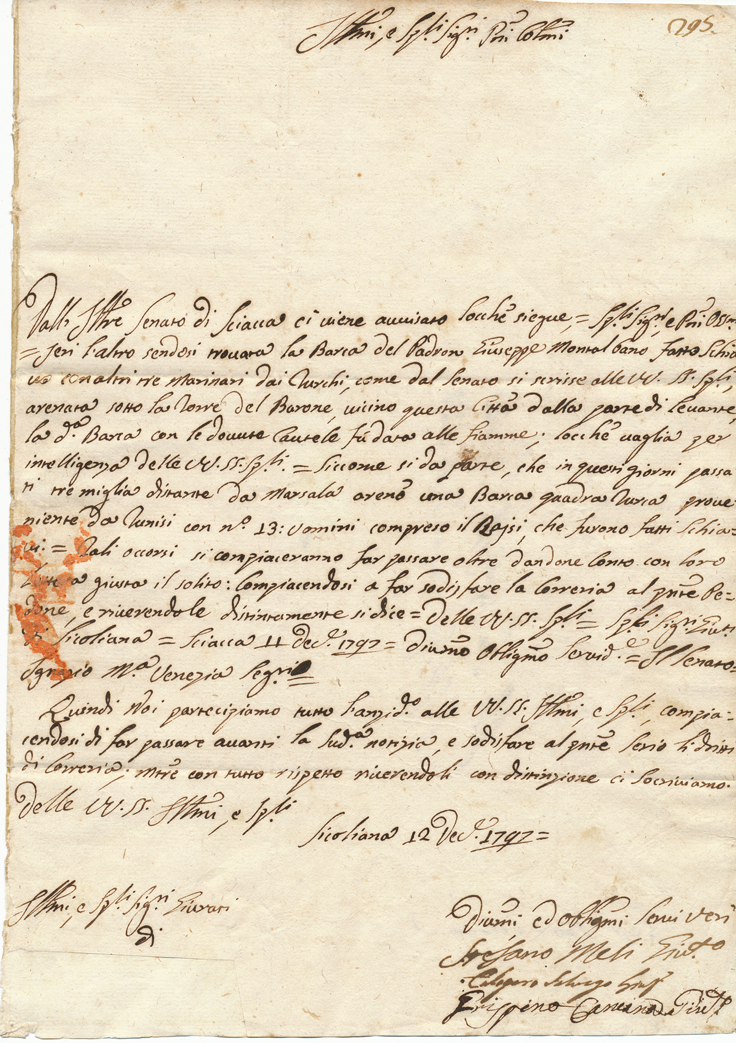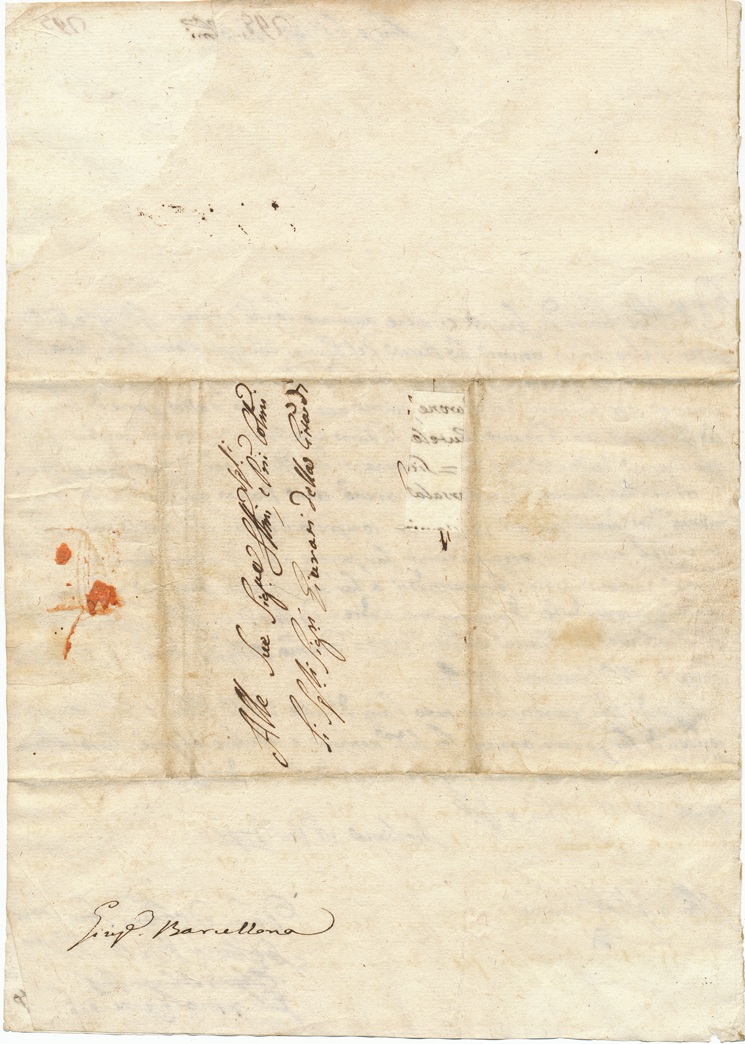Barbary Pirates
Barbary Pirates
Report of Pirates Enslaving Crews - 1797
Report of Pirates Enslaving Ships off the Barbary Coast!
Truly swashbuckling letter in Italian, dated 12 December 1797 and signed by several persons in the Sicilian Senate, from the southern Sicilian town of Siculiana, describing reports of slavery pirates off the coast of Marsala; that ship’s master Giuseppe Montalbano and three sailors had been enslaved by the Turks; and that in recent days another boat some three miles off Tunisia was taken with 13 men including the captain being captured as slaves. (Where an ellipsis “…” appears, the translation is indeterminate.)
Most Illustrious, Esteemed Mssrs …
We are given warning by the Illustrious Senate of Sciacca of what follows: Esteemed, Honourable Sirs…; the day before yesterday, having found the boat of the master Giuseppe Montalbano, who was made a slave along with three sailors by the Turkish, as was written by the Senate to Your Esteemed Lordships, stranded under the Tower of the Baron, close to this city, on the eastern side, the aforesaid boat was with due caution set ablaze, which is under the consideration of the intelligence of Your Esteemed Lordships, since we made known that some days ago, three miles away from Marsala, a Turkish square-rigged boat stranded, coming from Tunis with 13 men aboard, including the Rais [Commander], who were all made slaves. Such incidents shall be divulged, by recounting the usual, by fair reading: satisfying the courtesy of the Special Messenger whose name is found marked on the back and cordially greeting You. To Your Esteemed Lordships, Esteemed Mssrs… from Siculiana, Sciacca, 11th December 1797. Much obliged, devoted. The Senate. Ignazio…Venezia …
Therefore we make the aforesaid known to Your Illustrious, Esteemed Lordships, pleased to divulge the afore-mentioned piece of news, and to satisfy the courtesy of…, as deferentially and cordially greeting You, we take leave.
To Your Illustrious, Esteemed Lordships.
Siculiana, 12th December 1797
Illustrious, Esteemed MssrsMuch obliged, devoted…
Stefano…
Calogero…
Filippino

The famed Barbary Coast was a wild, untamed region of petty states and warlords whose reach extended deep into the Mediterranean Sea, from Gibraltar to the borders of Egypt. Each owed his allegiance to the Ottoman Sultan, who demanded that payment of an annual tribute be made to his treasury in exchange for the protection afforded by his Army. It was a tidy arrangement, one that worked well for the Sultan and those who knew their place in the social order. That the local rulers were obliged to share a portion of their meager income with Constantinople meant that new, more assured opportunities for profit would have to be found. The solution was piracy.
For nearly four centuries the Barbary States, and the brigands they employed, prowled the Mediterranean in search of prey. The lumbering merchant vessels of the time were no match for the Muslim corsairs, built for speed and lightning strikes. It was a way of life that took its toll on countless merchant ships, most of which were only lightly armed and had little capacity to resist capture.
The crews who fell victim to this banditry were destined, often times, for a miserable fate. After seizing their cargo and scuttling the vessels, the pirates would then ransom the ill-fated seamen back to their sovereign or the company that had chartered them. Usually, though, the victims of these maritime hijackings would languish in fetid prisons, unsure of when, or even if, they would ever be rescued. Most were sold into slavery.
It was a lucrative business, one that yielded great riches not only for the pirates, but also for the Muslim states that gave them refuge. For many of the rulers, plunder became a mainstay of their survival. In the parlance of our time this was state-sponsored terrorism pure and simple—an extortion racket in which the pirate, the petty states of North Africa and the Ottoman Empire were all complicit.
America’s First Hostage Crisis
The episode began in 1785, when an American schooner Maria, sailing off the coast of Portugal, was boarded by Algerian pirates. Its captain and five crewmembers were taken prisoners. Then a second American ship, the brig Dauphin was captured, and its 15-member crew was taken to Algiers and enslaved. Several hostages were put to work as domestic servants; another was forced to care for the Dey (King) of Algiers’s lion. Much of the time the hostages were kept in leg irons, chained to pillars or locked in a rat-infested prison. Six Americans died of bubonic plague; one went insane.
In a bid to free the American hostages, Thomas Jefferson, then Minister to France, offered to pay $200 ransom for each American prisoner. This sum was well below the going rate of $1,600 per hostage. As a result, the hapless prisoners languished in captivity. Over the next eight years, Algerian pirates seized more than a hundred hostages from a dozen captured American ships.
Finally, in 1795, the State Department dispatched a prominent American, Joel Barlow, to negotiate for the hostages’ release. To gain the captives’ freedom, the United States agreed to pay $800,000 plus annual tribute—which at the time totaled one-sixth of the entire U.S. budget—and to provide the Dey of Algiers with a brand-new 36-gun frigate. In 1797, the hostages were freed and sailed to Philadelphia, where they were greeted by cheering crowds.
Although the hostages were now free, the story was not yet over. After the military ruler of Tripoli learned that the Dey of Algiers had received an American frigate, he demanded a ship of his own. When the United States refused to accede to his demand, the Pasha of Tripoli seized an American merchant ship and ordered the flag of the U.S. consulate in Tripoli cut down.
Launched in 1797, the U.S.S. Constitution (“Old Ironsides”) and her sister ship, the U.S.S. Constellation, were built to wage war on the Muslim pirates operating along North Africa’s Barbary coast. The continuing demand for tribute ultimately led to the formation of the United States Department of the Navy, founded in 1798 in order to prevent further piracy attacks upon American shipping as well as to end the extremely large demand for tribute from the Barbary States.


